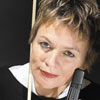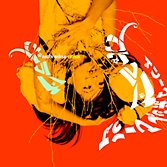
by Charlotte Deaver
Laurie Anderson's performance last Wednesday night at
Joe's Pub did little to change my view of her work, a view that has been both mixed and fixed. Appealing to what I'll call, oxymoronically, progressive elitists, it suits the lofty-minded, the educated, and the privileged. I don't care what anyone says, but as championing of the "good" and "just" as she can be, this woman does not get down and funky, and for that reason, does not challenge the status quo in the least bit. Rather, her music, texts, and art operate wholly within the realm of the very power structures (media, politics) she critiques.
One reason, I believe, her work is not liberatory or transgressive is partly because it remains at arm's length to the body, that crucial core from which music, or the liberatory aspect of music, emerges. That said, when she's interesting, she does get somewhere, body or not, worth a close listen. I found myself sleepy when she hurled high, girlish notes into the air and stroked her electronic violin, and found myself having to wipe off a snobbish, knowing, smirk on my face (old habit - shed, or so I thought, long ago) when she whispered witticisms and clever comments into the audience's cultured ears. But as she speaks, interspersing narrative with commentary, and then more commentary, the richness and musicality of her voice take over her elfishness, and she is able to hit a kind of home rarely reached by other conceptual musicians.
Her best, most mesmerizing piece of the evening, to my mind, included the telling of a myth about flocks of birds flying in space before time and the earth existed. They just flew around and around in empty space, until one day a father bird died, to the great sorrow of his children and family. They didn't know what to do with the body of their dead father, so finally, one of the larks decided to bury it in the back of her head. And this was the beginning of memory. Before this, time was just flying around in huge circles.
Other interesting pieces included a story about a dream she had of a naked man playing flute in a recording studio, who looked like he was covered in flies, but in fact, upon closer scrutiny, the flies were actually tiny microphones. And in another work, she paraphrased ideas from
George W. S. Trow's loved/hated essay from 1978, "
Within the Context of No Context. Describing the conflicts between the "grid of the individual" and the "grid of the media," her commentary found its way to narrative poetry, as is part of her genre, I suppose, and she ended the piece by moving from theoretical to metaphorical abstraction by drawing a verbal picture of a housewife sitting in her kitchen, eating cherry pie, "with topping made from offal and animal screams."
I also liked her piece about how "starting equals stuttering; that's where the fear is, at the start. At the end, there's no longer a reason to be afraid -- there are only the regrets" [please note that these quotes are taken from my notes, and are by no means exact].
In another mythic tale, she described her awe of the colossal Underwear Gods that lounge around all over large buildings in New York. Eventually they step down from their perches and walk through the streets, as all the imperfect humans below must shuffle out of their way.
Although one instrumental piece was truly gorgeous, drawing its influences from early chamber music and the obvious 20th-century sources, the music was generally disappointing. But, actually, I did expect that, being as drawn to rhythm, rock, and soul as I am. Her voice, too, is best in its deepest registers, which she uses mostly for speaking. Because her high notes grate, her "high" range works best when they refer to ideas, and not to music.



